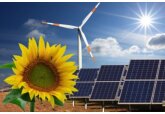
Over the last two years, 12 companies have invested more than 1.6 million euros in "green energy" development projects under the Livada Moldovei program.
This was reported by the European Investment Bank, which implements the EU-supported Livada Moldovei program in Moldova. Moldovan agricultural producers increasingly turn to renewable energy sources to sustainably develop their businesses and to cut energy costs. Loans from the EIB under the Livada Moldovei program were used by them to install photovoltaic panels as well as wind turbines. To buy PV panels, farmers receive loans under the Livada Moldovei program and subsidies from the Agency for Intervention and Payments in Agriculture, amounting to 50% of the investment totaling maximum 800 thousand lei. At the moment, along with investments in irrigation systems, the installation of photovoltaic systems is the most demanded project under the Livada Moldovei credit line. Experts note that the electricity produced by solar panels is clean and silent. Photovoltaic systems use only sunlight and do not emit CO2 and, therefore, do not pollute the environment. In agriculture, photovoltaic systems are installed mainly by large electricity consumers - companies that have warehouses, dryers or refrigerators. "Farmers get subsidies for photovoltaic installations and pay them back in 3, maximum 4 years, instead of 6-7 years as is usually the case. Currently, only in the agricultural sector is it possible to get such a quick return on investment," said Vitali Zveaghintev, director of a local company specializing in the installation of photovoltaic systems. The support scheme for farmers who have installed solar panels is net metering. "The surplus energy that is generated by the installation can be delivered to the grid, and that surplus is counted using a bi-directional meter. The surplus delivered to the grid can then be consumed back - at night, when no electricity is being produced, or in winter," says Vitali Zveaghintev. For example, if consumption is more important in autumn and winter, and energy production is higher in spring and summer, energy recipients store energy in the grid and consume it when they need it. If consumption is higher and there is no surplus stored in the grid, the farmer pays the difference, but if he produced more and distributed the power to the grid, he has the opportunity to sell it to distributors at the end of the year. There are also cases where the beneficiary does not pay for electricity, having managed to cover all his needs with photovoltaic systems. Experts note that the geographical location and climatic conditions in Moldova are favorable not only for this alternative energy source, but also for its development. "People understand the importance of energy independence, and those who have already installed a photovoltaic installation are even happier to have a source that does not depend on external resources. It is a safe investment because the panels have a long service life and require virtually no maintenance," says Vitali Zveaghintev. The cost of 1 kW of turnkey panels ranges from 650 to 800 euros. //20.12.2021 - InfoMarket.







